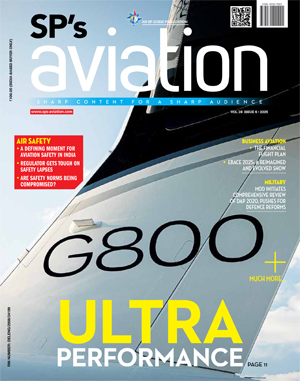INDIAN ARMED FORCES CHIEFS ON OUR RELENTLESS AND FOCUSED PUBLISHING EFFORTS

The insightful articles, inspiring narrations and analytical perspectives presented by the Editorial Team, establish an alluring connect with the reader. My compliments and best wishes to SP Guide Publications.

"Over the past 60 years, the growth of SP Guide Publications has mirrored the rising stature of Indian Navy. Its well-researched and informative magazines on Defence and Aerospace sector have served to shape an educated opinion of our military personnel, policy makers and the public alike. I wish SP's Publication team continued success, fair winds and following seas in all future endeavour!"

Since, its inception in 1964, SP Guide Publications has consistently demonstrated commitment to high-quality journalism in the aerospace and defence sectors, earning a well-deserved reputation as Asia's largest media house in this domain. I wish SP Guide Publications continued success in its pursuit of excellence.
- The layered Air Defence systems that worked superbly, the key element of Operation Sindoor
- Operation Sindoor | Day 2 DGMOs Briefing
- Operation Sindoor: Resolute yet Restrained
- India's Operation Sindoor Sends a Clear Message to Terror and the World – ‘ZERO TOLERANCE’
- Japan and India set forth a defence cooperation consultancy framework, talks on tank and jet engines
BizAv in the Gulf — Flying Smoothly
With their accommodating strategies, infrastructure, and exciting global events, the leading countries in the Middle East with the most extensive business aviation fleets are Saudi Arabia, Turkey, the UAE, Israel, and Egypt

In the realm of business aviation, the global market, valued at $42.14 billion in 2022, is poised for substantial expansion. Forecasts suggest a climb from $43.97 billion in 2023 to an impressive $62.66 billion by 2030. This surge is fueled by a notable rise in high-net-worth tourists, escalating the demand for private aviation and propelling global business aircraft sales. The bedrock of business aviation remains robust, with unwavering support from corporate clients and high-net-worth individuals (HNWIs). Projections hint at an additional boost from fleet modernisation initiatives undertaken by major and developing countries. These initiatives are expected to enhance fleet capabilities, spurring demand for new charter services featuring upgraded cabin interiors and cutting-edge avionics.
Anticipated constructive growth in the Middle East during the forecast period is underlined by substantial demand in economic powerhouses such as the UAE and Saudi Arabia. The surge in demand is further fueled by the need for private and environmentally friendly aircraft due to escalating aviation emission regulations. HNWIs in the Middle East contribute significantly to shaping the market’s demand dynamics. The Middle East stands as one of the fastest-growing aviation markets globally, with an annual regional fleet expansion of 5.1 per cent over the next decade.
REGIMES AND EVENTS PAVE THE WAY
Notably, the Middle East outpaced the rest of the world in reviving international air travel, surpassing pre-pandemic levels in the first quarter of 2023. The region reaped benefits from heightened air traffic during mega-events like the World Cup in Qatar and the Dubai Expo. These occasions served as catalysts for business and leisure travel, fostering a sustained demand for private jet charter flights. The Expo served as a platform for businesses, including SMEs and startups, to meet, exchange ideas, and enter the UAE market, indirectly stimulating the demand for business and leisure travel. Demand for private jet charter flights in the Middle East is expected to continue to grow beyond these mega events as well. The Global Fleet and MRO Market Forecast 2023-2033 also predicts the Middle East aviation market to continue accelerated take-off over the next 10 years with the region’s share of the global fleet set to expand.

As reported by the Middle East & North Africa Business Aviation Association (MEBAA), a substantial 70 per cent of private jet flights in the Middle East region are designated for business purposes. The leading countries in the Middle East with the most extensive business aviation fleets are Saudi Arabia, Turkey, the UAE, Israel, and Egypt. In 2022, the private aviation sector in the Middle East displayed robust growth, witnessing an annual increase of 25 to 27 per cent in terms of aircraft movements. Notably, individuals who transitioned from first and business-class travel to private aviation during the COVID-19 pandemic have sustained this shift, opting for chartered flights over scheduled airlines.
Additionally, in Dubai, a study by S&P Global revealed a significant expansion in business conditions in October, marked by the fastest acceleration in new business intakes in four years. The city’s economy, experiencing a 3.2 per cent growth in the first half of 2023, benefited from its ambitious D33 economic growth strategy, targeting a surge in foreign direct investment (FDI) to Dhs650 billion by 2033. The UAE’s effective pandemic policies, characterised by a comprehensive testing regime and a swift vaccine rollout, facilitated a notable increase in visitor numbers and a revival in business activities. Statistics from the Dubai Department of Economy and Tourism indicated a remarkable influx of 6.17 million international visitors from January to May 2022, tripling the figures recorded in the same period the previous year. Accommodation establishments in the UAE, particularly hotels, experienced a notable 10 per cent growth in the first quarter of 2022 compared to the same period in 2019.
INFRASTRUCTURE DEVELOPMENT PROPELS BUSINESS AND CORPORATE TRAVEL
Dubai’s world-class infrastructure, encompassing hotels and leisure destinations, positions it as an ideal hub for business travelers seeking relaxation after corporate events. Infrastructure development, including increased space allocation at airports, plays a pivotal role in propelling the business and corporate travel segment forward. Regional airports in Oman, Bahrain, and Kuwait have invested in expansions tailored to accommodate private and charter planes.
In Saudi Arabia, a key market for private aviation in the Middle East, airport expansion projects in Riyadh and Jeddah are contributing to a surge in private aviation. The adoption of new technologies, such as enhanced cabin data connectivity and improved navigation systems, coupled with improved infrastructure, stands as a cornerstone for sustaining growth in private aviation in the future.
THE HUB FOR BUSINESS AVIATION
Dubai, bolstered by strong revenues from elevated oil prices and its status as a magnet for personal and corporate wealth, remains the pre-eminent hub for business aviation activity in the Middle East. This is evident at the Dubai Airshow, where new facilities, including the state-of-the-art ExecuJet FBO, contribute to the flourishing business aviation landscape. In 2022, the Mohammed Bin Rashid Aerospace Hub (MBRAH) at Al Maktoum International Airport recorded over 15,400 business jet movements. Figures for the first half of 2023 indicate about 7,300 business jet movements, showcasing sustained momentum.
Strategic initiatives by the government have propelled Dubai to achieve record visitor numbers, attracting global investors and individuals enticed by the ease of doing business, safety, security, and attractive visa schemes. The hosting of the FIFA World Cup 2022 in Qatar further boosted private jet movements to Dubai via the VIP Terminal at MBRAH. With significant growth opportunities in Saudi Arabia, the wider Gulf region is emerging as a focal point for diversification in the private aviation sector. Saudi Arabia leads this growth trajectory, followed by the Emirates and Qatar, reflecting the rapid ascent of private aviation in the Arab Gulf region.
“MEBAA has been at the forefront of driving innovation and technological advancements within the industry. We have actively encouraged research and development initiatives, supported the adoption of sustainability, and embraced emerging technologies to improve efficiency and reduce environmental impact”
—Ali Ahmed Alnaqbi, MEBAA Founding & Executive Chairman and Chair of the Governing Board of International Business Aviation Council (IBAC)
Some of the examples over the last year, showcasing the growth of business aviation in the Middle East include:
- Vista Global, a Dubai-based business travel services company, highlighted the Middle East as a key market in Q1 2023. The company cited several growth factors, including rising demand from India and private travel to and from Neom in Saudi Arabia. Vista Global is optimistic about the region’s prospects. Emphasising Dubai International Airports’ continued importance, the company sees the Middle East as a significant contributor to its global expansion within the Gulf Cooperation Council (GCC) countries.
- In 2022, VistaJet experienced a 50 per cent global revenue increase compared to 2021. The Middle East played a significant role in this growth, with a 72 per cent increase in flights to Saudi Arabia and a remarkable 146 per cent increase to Qatar, attributed to the FIFA World Cup. Dubai’s Al Maktoum International Airport emerged as a key hub for VistaJet members globally.
- Jet Aviation is expanding its line maintenance operations in Abu Dhabi and Jeddah to support its sister company, Gulfstream. The expansion includes enhancing line maintenance capabilities and AOG (Aircraft on Ground) services in Jeddah and Riyadh, with approvals for Gulfstream G-IV, G-V, G550, G650, BBJ, ACJ, and CL604 under GACA-145 and FAA repair station. The addition of the G700 is also planned.
- EAG’s Dhamecha reported ongoing expansion in its aircraft management division, with recent additions including a Boeing Business Jet, an Embraer Legacy 600 to the UAE registry, and a Bombardier Challenger 604 to its Nigeria fleet. Another aircraft is set to join the management portfolio later in 2023 or early 2024. The charter fleet comprises the BBJ, Global 7500, three Global 6000s, one G650, two Legacy 650s, and one Legacy 600, reflecting sustained demand with increasing interest in extended leasing periods. EAG notes robust activity in aircraft sales, charter bookings, and revenue, with consistent high double-digit growth, hinting at a positive outlook across all service lines in 2024.
- Airbus Corporate Jets secured six orders and completed five deliveries globally last year. The first ACJ TwoTwenty, the executive version of the Airbus A220 airliner, was delivered to Dubai-based FIVE Hotels and Resorts on April 28, 2023, before being presented to the public in Dubai in May. The company anticipates selling 15 ACJs to Middle Eastern government, VIP, and charter operators over the next five years. ACJ notes a substantial increase in business jet traffic, up 42 per cent compared to the same 2019 period, particularly impacting regional charter availability. With approximately half of the 270 bizliners in the Middle East over 15 years old, the market is poised for replacement orders, considering the cyclical nature of the Middle East market. Global bizliner deliveries peaked at 19 in 2009, with 2015 closely trailing at 17 units. The expectation is for bizliner shipments to rise in the coming decade. The Middle East stands as Airbus Bizliners’ leading global market, boasting 130 ACJs out of a total worldwide fleet of 420.
- Boeing Business Jets recorded four orders, with two in progress and one completed delivery in 2022. The company has received a total of 15 BBJ MAX orders, delivering eight, with seven more in the pipeline. WingX flight data highlighted that 34 per cent of all BBJ flights from January 2019 to September 2022 either arrived or departed in the Middle East. The company too emphasised the Middle East’s significant impact despite representing only 2.5 per cent of global business jets, hosting 55 per cent of those in the large or bizliner segments. Boeing identifies around 820 business jets in the Middle East and Africa (MENA) region, with the Middle East alone contributing 25 per cent to the worldwide bizliner fleet, totaling 98 aircraft. Government, VVIP, charter, and corporate operators in MENA host 29 per cent of the BBJ fleet, with 78 aircraft, and the UAE leading with 30. Saudi Arabia follows with 29, and the Gulf Cooperation Council collectively houses 69. The Middle East claims 44 head-of-state widebody aircraft, with Boeing asserting 32 BBJ types. Moreover, the Middle East hosts half of all widebody BBJs and the two largest BBJ operators.
- Transworld Group, a global logistics conglomerate, has unveiled Airavat Aviation (Airavat), a new venture in private aviation travel. This luxury private jet initiative, featuring a fleet of Hawker 4000 super-midsize business jets, will provide hyper-personalised aviation services in the Middle East. Operating from its Dubai base, Airavat aims to meet the growing demand for luxury travel in the region. Airavat targets ultra-high-net-worth individuals (UHNWIs) and business leaders, offering secure, opulent, and eco-friendly travel experiences, with plans to secure an 8 to 10 per cent market share in the next five years.
According to MEBAA, a substantial 70 per cent of private jet flights in the Middle East region are designated for business purposes
Reports also suggest that the Middle East and Africa jet charter market is projected to expand from $511.52 million in 2023 to $851.90 million by 2028. With these predictions and many other developments alongside many new orders, announcements, and revelations expected from the Dubai Airshow 2023, the Middle East is strengthening its hold in the business aviation market.






